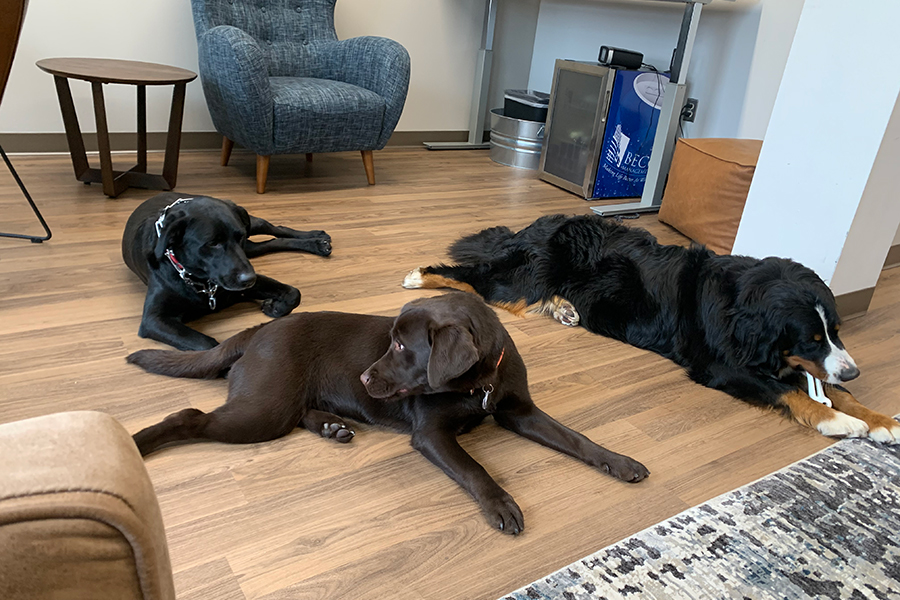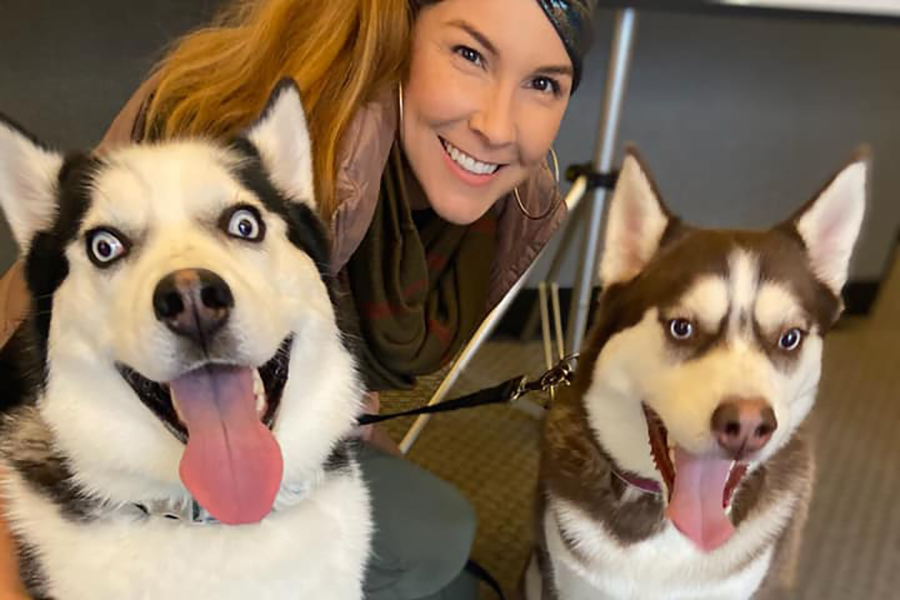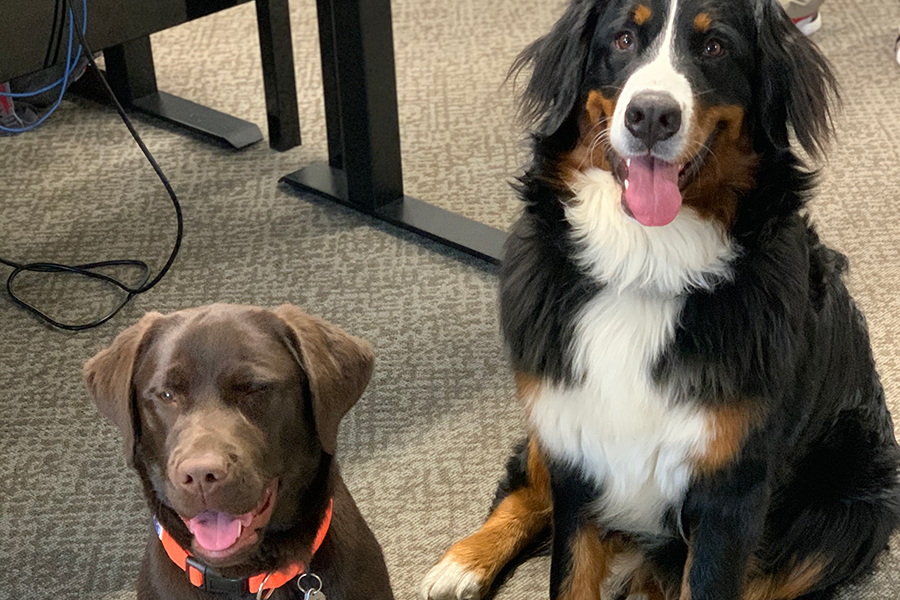

When advisers begin returning to offices full time, some will ask if they can bring their four-legged companions with them.
And that could be good for office environments -- studies show that dogs give a psychological boost to their humans and can even help improve relationships between people.
As the country sheltered in place during the worst months of the pandemic, interest in adopting dogs increased. A recent paper in the journal Nature also found that people became closer to their companion animals, whether they were recently adopted or longtime members of the family.
Asking people to return to offices and thus spend the day apart from their animals could take a toll on job satisfaction.
In March, One Digital-owned Fiduciary Plan Advisors held an in-office birthday party for senior vice president of retirement services Jania Stout’s one-year-old Bernese mountain dog, Khaleesi.
All workers can bring their dogs in, and there are at least six regular canine visitors in Stout’s office, including her other dog, Zaylee, who is a rescued Labrador mutt. Other frequent guests are Fletcher, “a hound who loves to howl at firetrucks” and is found of acoustic music; Murph, an eight-month-old chocolate lab; Carlie, a half-year-old golden doodle; and Nico, a six-month-old rescue pooch, Stout said in an email.
“The dogs have been on committee meeting Zoom calls, and when we do our videos for clients and participants, sometimes they make star appearances,” Stout said. “Who doesn’t smile when they see a dog? It ties into the second half of our mission statement, ‘Help working America feel less stressed and be happy!’”
The office has dog bowls and a basket of toys. The start of the workday is a social hour for them, Stout said.
“They run around like crazy for the first hour or so and then just collapse with exhaustion,” she said.
“They all get along so well, and it truly brightens everyone’s day.”
Although more people were interested in adopting dogs last year, the number of adoptions was down compared to 2019, as fewer dogs ended up in rescues and shelters, data from Shelter Animals Count show. That meant long waits for many people on adoption lists, especially with the increased demand.
And despite reports that some people have started returning their rescued dogs to shelters amid a return to office life, that is not the case for most new pet parents, The New York Times found.









During the pandemic, people’s relationships with their animals became more important, especially in helping overcome the loneliness resulting from social isolation. And that went for the dogs as well, according to the study published in Nature.
“[T]here was a clear association between individual’s quality of life and their perceptions of their dog’s quality of life and behavior, as well as the probability of relinquishing the dog,” that paper noted. “As humans and dogs are both social animals, these findings suggest potential benefits of the human-dog relationships during the Covid-19 pandemic … implying that there is a bidirectional connection between the welfare and health of humans and non-human animals.”
That raises the possibility that leaving a newly adopted dog at home for long hours could have a negative psychological effect on both the dog and the person.
A 2017 paper published in the International Journal of Environmental Research and Public Health found that prior studies have linked dogs in offices with lower stress levels and higher job satisfaction for the people who bring them in. However, the authors of that paper noted that employers should also consider other factors in determining what their policy should be, using “a procedure to assess employees’ attitudes, beliefs and opinions concerning the presence of dogs in the workplace.”
At Plymouth, Mass.-based SHP Financial, it’s common for clients to bring their dogs into the office, said Michelle Short, the firm’s chief operating officer.
“We’re on the Plymouth waterfront, so a lot of our clients are walking their dogs,” Short said.
The firm keeps cookies and water bowls on hand, and SHP sends clients with new pets a “bark or meow” gift box, she said.
Over the holidays, the company had a dog event, although employees can bring their canines in whenever they want. On average, there is a dog present two or three times a week. About half of the staff adopted dogs during the pandemic, Short said, herself having brought home a black lab, Henry, who is now over a year old.
“For me, being the COO, sometimes people think I’m stuffy,” she said. Bringing Henry into work “shows that I’m real … I have a heart. I love animals.”
The presence of dogs helps reduce stress for everyone, and it’s a hit with new hires, she noted.
“A lot of us adopted them during Covid, so there is an abundance of dogs … It was a big, stressful year we came off of, and animals help with that.”
Vestwell’s lease for its Manhattan office specifically allows dogs, CEO Aaron Schumm said. Employees have just recently started to return to work, he said.
“Most people here are dog lovers,” he said. Prior to the pandemic, “there [were] about three or four dogs on random rotations that would show up.”
Schumm is among those who brought home a Covid pet, a “wild puppy” who might not quite be ready for the office, he said.
The change in culture that resulted from remote work and video meetings has also made the idea of pets at work more acceptable, especially with animals being a part of the family for so many, he said.
“We’ve all gotten pretty comfortable with people’s personal lives in a professional world,” he said.
Another firm, Clearview Advisory, has long had a dog-friendly office, managing partner Greg Fiore said.
“For employees, the happiness factor is so significant compared to what it costs the employer,” he said. “It doesn’t cost us any money to [allow you to] bring your dog to work.”
Fiore’s dog Zoe, who recently died at 16, was a regular at the office, coming in three or four days a week, he said. His family recently brought home another dog, Penny, who occasionally makes appearances.
“When we have somebody interviewing for a position here, we will intentionally bring a dog in, to see how they react,” Fiore said. “If you’re not a dog person, you’re probably not going to fit in here.”
That also goes for clients, he noted.
When account manager Langdon Vance brought his adopted Pit Bull mix, Cowboy, to the office, the company announced it on LinkedIn. That post became the most popular one Clearview had made, Vance said.
“He’s got a lot of learning to do -- he still barks in the office, which people have handled here pretty graciously,” he said. “I like to think that he brightens people’s day.”
Recently, Clearview was acquired by OneDigital, and that is resulting in an office relocation by Sept. 1, Fiore said. That existing OneDigital location does not allow companion dogs in the office, although Fiore said he hopes to change that.
“He’s going to get frustrated that the 25- and 30-year-olds aren’t going to want to come in,” he said. “If you allow them to bring in their dogs, they’ll come into the office, and they’ll be more collaborative. And they’ll make you more money.”

"Im glad to see that from a regulatory perspective, we're going to get the ability to show we're responsible [...] we'll have a little bit more freedom to innovate," Farther co-founder Brad Genser told InvestmentNews.

Former advisor Isaiah Williams allegedly used the stolen funds from ex-Dolphins defensive safety Reshad Jones for numerous personal expenses, according to police and court records.

Taking a systematic approach to three key practice areas can help advisors gain confidence, get back time, and increase their opportunities.

Meanwhile, Osaic lures a high-net-worth advisor from Commonwealth in the Pacific Northwest.

The deals, which include its first stake in Ohio, push the national women-led firm up to $47 billion in assets.
Orion's Tom Wilson on delivering coordinated, high-touch service in a world where returns alone no longer set you apart.
Barely a decade old, registered index-linked annuities have quickly surged in popularity, thanks to their unique blend of protection and growth potential—an appealing option for investors looking to chart a steadier course through today's choppy market waters, says Myles Lambert, Brighthouse Financial.
